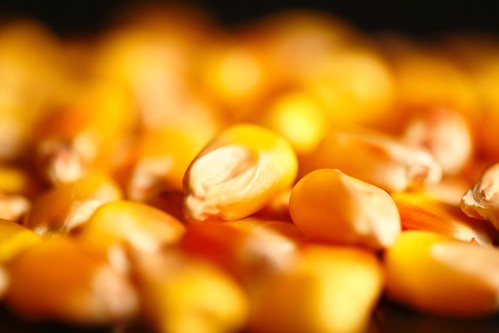 |
| Corn kernels Photo by Ian Hayhurst on Flickr |
“where is the scientific evidence showing that GM plants/food are toxicologically safe, as assumed by the biotechnology companies involved in commercial GM foods?”The same author, José Domingo, has now repeated his review process for the subsequent years (2006-2010).
Domingo found the total number of citations had “dramatically increased”, but those “specifically focused on safety questions of GM plants” is still limited. Feeding studies have been published only for commodity crops: maize (15 studies on 12 different GM varieties), soya (9 studies on 6 different GM varieties), and rice (4 studies on 4 different GM varieties). Note that allergenicity was not included in the review.
In contrast to the previous finding in which one-fifth of citations gave indications of pathological symptoms, there is now an equilibrium in the number of research groups reporting no evidence of harm and those raising serious concerns. However, it's notable that most of the published studies giving GMOs a clean bill of health come from the biotech companies responsible for commercialisation of the novel seed.
Although all GM products currently on the market have gone through a risk assessment by national authorities, these have not been systematically performed. There remains a diversity among the methods used which reflects the complexity of the subject.
Other reviewers agree in general terms that:
“more scientific efforts are clearly necessary in order to build confidence in the evaluation and acceptance of GM food/plant by both the scientific community and the general public”.One such author remarked that the “results of most studies with GM foods would indicate that they may cause some common toxic effects such as hepatic, pancreatic, renal, or reproductive effects, and might alter the hematological, biochemical, and immunologic parameters”.
OUR COMMENT
Reviews give a much clearer picture of the state of the science than any single experiment can do. What this latest review on GM feeding studies amounts to is that, we have a bit more evidence than before, but that evidence certainly does not show GM foods are safe.
Contrary to industry and government claims, there are no signs that a robust and protective risk assessment procedure has been established
Important questions are still far from being answered. Your demands for key studies on GM food safety, especially for vulnerable groups, for reproductive health, and for chronic effects on all major organ systems are still sorely needed.
SOURCE
- J. L. Domingo and J. G. Bordonaba, 2011, A literature review on the safety assessment of genetically modified plants, Environment International 37
No comments:
Post a Comment
Thanks for your comment. All comments are moderated before they are published.